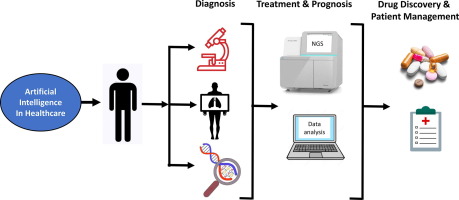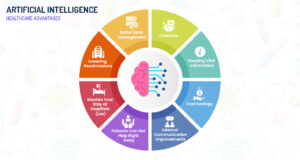How AI Aids in Cancer Research

Cancer research has long been a complex and challenging field, characterized by its intricate biological mechanisms and the vast amount of data required for effective study and treatment. However, advancements in artificial intelligence (AI) are revolutionizing how researchers approach cancer, offering new tools and methodologies that enhance our understanding, diagnosis, and treatment of this formidable disease. AI’s impact on cancer research is profound and multifaceted, spanning from accelerating drug discovery to personalizing treatment plans. This article explores how AI aids in cancer research, highlighting its applications, benefits, and future potential.
Enhancing Diagnostic Accuracy
One of the most significant ways AI aids in cancer research is through improving diagnostic accuracy. Traditional diagnostic methods, such as imaging and histopathological analysis, often rely on human interpretation, which can be subject to error or variability. AI algorithms, particularly those using machine learning techniques, can analyze medical images with remarkable precision. For instance, AI models trained on vast datasets of annotated medical images can detect subtle patterns and anomalies that might be missed by the human eye.
Deep learning, a subset of AI, has shown exceptional promise in analyzing radiological images such as MRI, CT scans, and mammograms. These AI systems can identify signs of cancer at early stages, which is crucial for effective treatment. Studies have demonstrated that AI can match or even surpass the diagnostic accuracy of experienced radiologists, particularly in detecting certain types of cancers like breast cancer and lung cancer. This enhanced accuracy not only improves early detection but also reduces the rate of false positives and false negatives, leading to more reliable and timely interventions.
Accelerating Drug Discovery and Development
AI also plays a crucial role in accelerating the drug discovery and development process, which is traditionally a lengthy and costly endeavor. AI algorithms can analyze complex biological data to identify potential drug targets and predict how different compounds will interact with these targets. By leveraging large-scale datasets, including genomic, proteomic, and clinical data, AI can help researchers uncover new insights into cancer biology and identify novel therapeutic candidates.
For example, AI-powered platforms can sift through vast amounts of data to identify patterns and correlations that might suggest new drug targets or combinations. These insights can significantly shorten the time required for drug discovery and increase the likelihood of identifying promising compounds. Moreover, AI can optimize clinical trial design by predicting patient responses to treatments and identifying suitable candidates for trials. This not only speeds up the development process but also enhances the precision of clinical trials, making them more efficient and effective.
Personalizing Treatment Plans
Personalized medicine is a growing field that aims to tailor treatment plans to the individual characteristics of each patient, and AI is a key enabler of this approach. By analyzing a patient’s genetic makeup, tumor characteristics, and other relevant data, AI can help create personalized treatment plans that are more likely to be effective. This involves integrating data from various sources, such as genomic sequencing, electronic health records, and clinical trial results, to develop a comprehensive understanding of the patient’s condition.
AI algorithms can identify patterns and predict how different treatments will perform based on the individual’s unique profile. This can lead to more targeted therapies that address the specific genetic mutations or molecular alterations present in the cancer. Personalized treatment plans not only improve the chances of successful outcomes but also reduce the likelihood of adverse effects by avoiding treatments that are less likely to be effective for a particular patient.
Facilitating Precision Oncology
AI is instrumental in advancing precision oncology, a field that focuses on tailoring cancer treatment based on the genetic and molecular characteristics of tumors. Precision oncology involves analyzing large datasets of genomic, transcriptomic, and proteomic information to understand the underlying mechanisms driving cancer progression. AI can process and interpret these complex datasets, providing valuable insights into how specific genetic mutations influence cancer development and response to treatment.
Machine learning algorithms can identify genetic mutations and other biomarkers that are associated with different types of cancers, helping researchers and clinicians understand which pathways are involved and how they might be targeted with specific therapies. AI can also predict how tumors will evolve over time and how they might develop resistance to treatments, allowing for more proactive and adaptive treatment strategies.
Improving Patient Outcomes and Quality of Life
AI’s impact extends beyond research and treatment to improving patient outcomes and quality of life. AI-powered tools can help monitor patients in real-time, track their responses to treatment, and provide early warnings for potential complications. For example, wearable devices equipped with AI can track vital signs and other health metrics, alerting healthcare providers to any significant changes that may require immediate attention.
Additionally, AI can aid in managing the side effects of cancer treatments by analyzing patient data to identify patterns and recommend interventions to alleviate symptoms. This can enhance the overall quality of life for cancer patients by providing more personalized and timely support.
Future Prospects and Challenges
The future of AI in cancer research holds tremendous promise. As AI technology continues to advance, its applications in cancer research are likely to expand further. Emerging areas such as genomics, metabolomics, and single-cell analysis are expected to benefit from AI’s ability to process and interpret large-scale data. Innovations in AI are also anticipated to improve the integration of multi-modal data, enabling a more holistic approach to cancer research and treatment.
However, there are challenges to address. Ensuring the quality and representativeness of data used to train AI models is crucial to avoid biases and ensure generalizability across diverse populations. Additionally, regulatory and ethical considerations must be carefully managed to ensure the responsible use of AI in healthcare.
Conclusion
AI has become a powerful ally in the fight against cancer, offering new tools and methodologies that enhance diagnostic accuracy, accelerate drug discovery, personalize treatment plans, and improve patient outcomes. As technology continues to evolve, AI is poised to play an increasingly central role in cancer research, driving innovations that hold the potential to transform the landscape of cancer care. By addressing existing challenges and embracing the opportunities AI presents, researchers and clinicians can work together to advance our understanding of cancer and improve the lives of those affected by this challenging disease.







